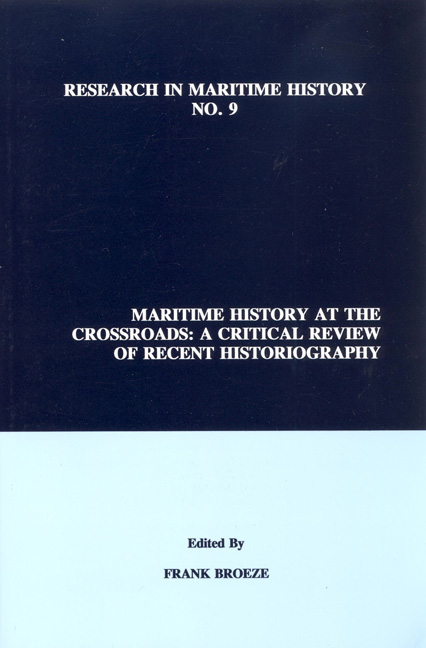Book contents
- Frontmatter
- Contents
- About the Editor
- Introduction
- Contributors
- “Maritime History in Australia”
- “The Enterprising Canadians: An Assessment of Canadian Maritime History since 1975”
- “The Historiography of Maritime China since c. 1975”
- “Danish Maritime History, 1976-1992: A Review”
- “German Maritime Historical Research since 1970: A Critical Survey”
- “The Maritime Historiography of Greece in Recent Decades”
- “Ibero-American Maritime History: Recent Advances in Research, 1975-1994”
- “Indian Maritime Historiography: West Coast Merchants in a Globalizing Economy”
- “Recent Developments in the Historiography of Maritime History in the Netherlands”
- “The Ottoman Empire: Recent Research on Shipping and Shipbuilding in the Sixteenth to Nineteenth Centuries”
- “The Progress of Maritime History in Spain since 1975”
- “Oceanic Historiography: The American Dimension”
“The Enterprising Canadians: An Assessment of Canadian Maritime History since 1975”
from Contributors
- Frontmatter
- Contents
- About the Editor
- Introduction
- Contributors
- “Maritime History in Australia”
- “The Enterprising Canadians: An Assessment of Canadian Maritime History since 1975”
- “The Historiography of Maritime China since c. 1975”
- “Danish Maritime History, 1976-1992: A Review”
- “German Maritime Historical Research since 1970: A Critical Survey”
- “The Maritime Historiography of Greece in Recent Decades”
- “Ibero-American Maritime History: Recent Advances in Research, 1975-1994”
- “Indian Maritime Historiography: West Coast Merchants in a Globalizing Economy”
- “Recent Developments in the Historiography of Maritime History in the Netherlands”
- “The Ottoman Empire: Recent Research on Shipping and Shipbuilding in the Sixteenth to Nineteenth Centuries”
- “The Progress of Maritime History in Spain since 1975”
- “Oceanic Historiography: The American Dimension”
Summary
In the late 1970s, an eminent British maritime historian remarked upon the renewal of scholarly interest in Canadian maritime history. Summarizing the results of a major conference held in St. John's, Robin Craig, then of University College, London, praised a generation of “enterprising Canadians” for reviving interest in the historical relationship between people and the sea. If the renaissance at which he hinted has been less successful than he might have wished, it has nonetheless produced some works that by either national or international standards have had an impact. Yet the “revolution” not only has been incomplete but also topically biased: on some subjects there is a very rich literature while other sectors remain remarkably backward. Many of the most glaring gaps occur in the areas of non-naval history; by contrast, Canadian naval history has arguably been well served by historians, especially in the past decade or so. In this essay I intend to survey a portion of this body of writings, although I make no pretence to completeness. To make the task manageable, I will focus for the most part on those publications that have appeared in the past twenty years. Regrettably, since this is an essay on the maritime history of Canada, I have been forced to exclude almost all the rich body of work by Canadians on marine topics abroad.
A realistic judgement about the state of Canadian maritime history depends upon the perspective. Some regions, such as the east coast, have been reasonably well-served by scholars while others, like the Pacific coast, have been studied less adequately by professional historians, although perhaps more intensively by gifted amateurs. Canadians have made major contributions to the histories of the navy, merchant shipping, fishing (including whaling and sealing) and maritime social and economic history, but have been relatively neglectful of topics such as the history of shipping firms, ports or the impact of technological change. Ultimately, though, I would judge the output of Canadian maritime history over the past two decades to have been above average by international standards. To support this contention, I examine below some of the main trends in recent Canadian maritime scholarship.
- Type
- Chapter
- Information
- Maritime History at the CrossroadsA Critical Review of Recent Historiography, pp. 31 - 52Publisher: Liverpool University PressPrint publication year: 1995



